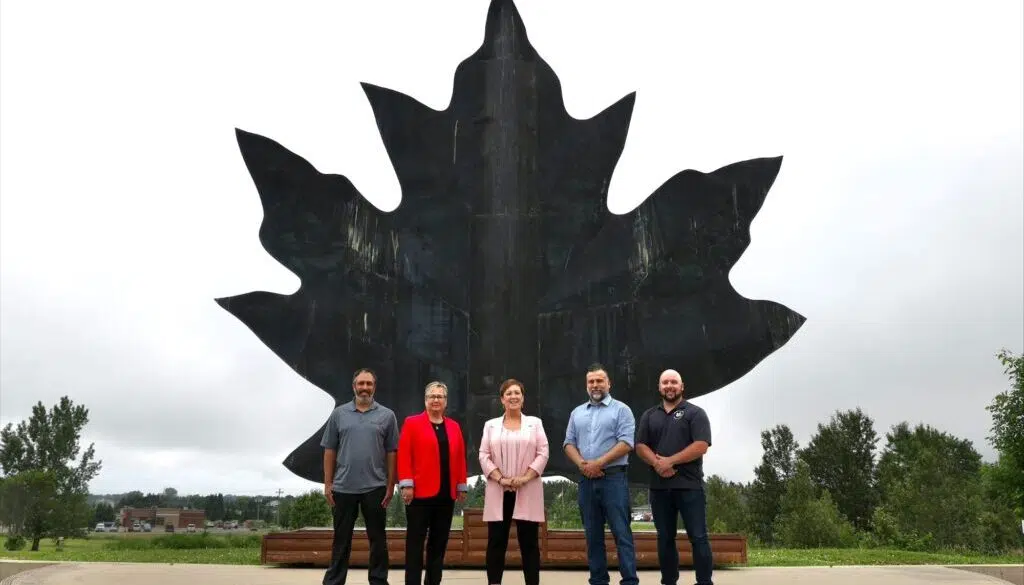The amount of Crown land available for maple syrup production has just increased in New Brunswick by 5,000 hectares.
Agriculture Minister Margaret Johnson estimates that the new land allocation, which will be leased over the next five years, could grow the province’s maple industry by “one million taps.”
“The beauty of this project is that we’re not going out and saying ‘you have to choose from A, B, C or D,’” Johnson says of the land allocation strategy. “We’re having the proponent identify what lands they’re interested in, whether they’d be crown or private, and then that becomes part of the plan to see if we can make those parcels available to them, and if they’re adjacent to their existing properties, that’s even better.”
The land will be available to both existing maple syrup producers and for new producers and will be allocated and assessed on a case-by-case basis. The process starts with applicants submitting their requests through the Maple Leasing Sector Opportunities page on the government’s website.
Those wishing to start new leases must meet a 5,000 tap minimum threshold and must submit their proposal by January 31, 2024. Additions to existing sugaries can hold 5,000 taps or less, with an ongoing deadline for proposals.
“We’ve got some density evaluations and density data we can look at. What kind of maple is growing in that area, how dense it is [helps us decide] whether you’d be able to get a sufficient number of taps,” she says. “The smallest category would have 100 taps in it, then the next one up is more than 150…it’s a matter of looking at the parcel the producer has identified and then saying ‘is this viable?’”
The expansion of land for maple syrup production comes following calls from the industry to increase the amount of Crown land available for production by 12,000 hectares. While the new allocation does not meet the amount of land asked for, New Brunswick Maple Syrup Association president Frédérick Dion says he’s happy that something has been done.
“The long-awaited announcement of these new Crown land allocations marks an important milestone for New Brunswick’s maple syrup industry,” said Dion in a press release. “Our member producers will now be able to implement their growth plans to meet the ever-increasing demand for maple-derived products around the world.”
The 2023 maple syrup season saw bad weather, resulting in a 50 per cent reduction in output that some producers described as a “disaster.” More taps could help mitigate other negative production factors.
The industry has more than 200 commercial producers and generates about 2,285 seasonal and full-time jobs. New Brunswick maple products reached a value of $33 million in 2022.
Of the 186,000 hectares of maple-dominated Crown land in New Brunswick, 7.7 per cent is leased to sugaries and 45,000 hectares are set aside for conservation. But Crown land use is not a single industry or interest imperative, and there are disagreements about land use.
In a press release, the government says it “is completing the duty to consult process with First Nations while seeking out interest in the expansion of maple sugaries. This consultation process will be completed before any final decisions are made.”
“We have done consultations,” Johnson says. “We’ve had Aboriginal Affairs, the Department of Natural Resources, Energy and Development, and the Department of Agriculture, Aquaculture and Fisheries all working [together]. This is one of those great initiatives that has really broken down silos and had departments working together to try to bring it across the line.”
However, Mi’gmawe’l Tplu’taqnn [MTI] Chiefs issued a statement saying they were not made aware of the changes until June 30, nor were they consulted about the impacts.
“There has been no discussion if this expanded area will impact hunting grounds; if these areas contain plants and medicines that are gathered by our community members; or if there are special or sacred sites where ceremonies are practiced located in this expanded area. The Mi’gmaq have not been given an opportunity to ask questions and see if concerns can be addressed or mitigated. Without a doubt, the Crown has failed in its duty to consult with us on this Strategy,” the statement, in part, said.
MTI chiefs acknowledged that the maple syrup industry “wants an opportunity to develop but we have to make sure this is not at the expense of our rights.”
“We will review the documentation and, if necessary, work with the appropriate leasee and the provincial government to see if our concerns and / or requests can be accommodated. Unfortunately, if our concerns are not meaningfully addressed, we may be left with little choice but to challenge the validity of these leases.”
Meanwhile, the forestry industry has also been at loggerheads with the maple sugaries’ desire to expand.
In February 2022 Forest NB executive director Kim Allen issued a statement that warned in part that the 12,000 hectares requested by maple sugaries “if put into syrup production… will result in a loss of already strained hardwood supply for several major employers.”
Johnson says compromise is possible.
“Maple represents five per cent of all Crown land,” Johnson says. “I think we have to have the lumber industry and the maple industry recognize that there’s room for everybody on this stage and that we can certainly work together.”
Alex Graham is a reporter with Huddle, an Acadia Broadcasting content partner.







